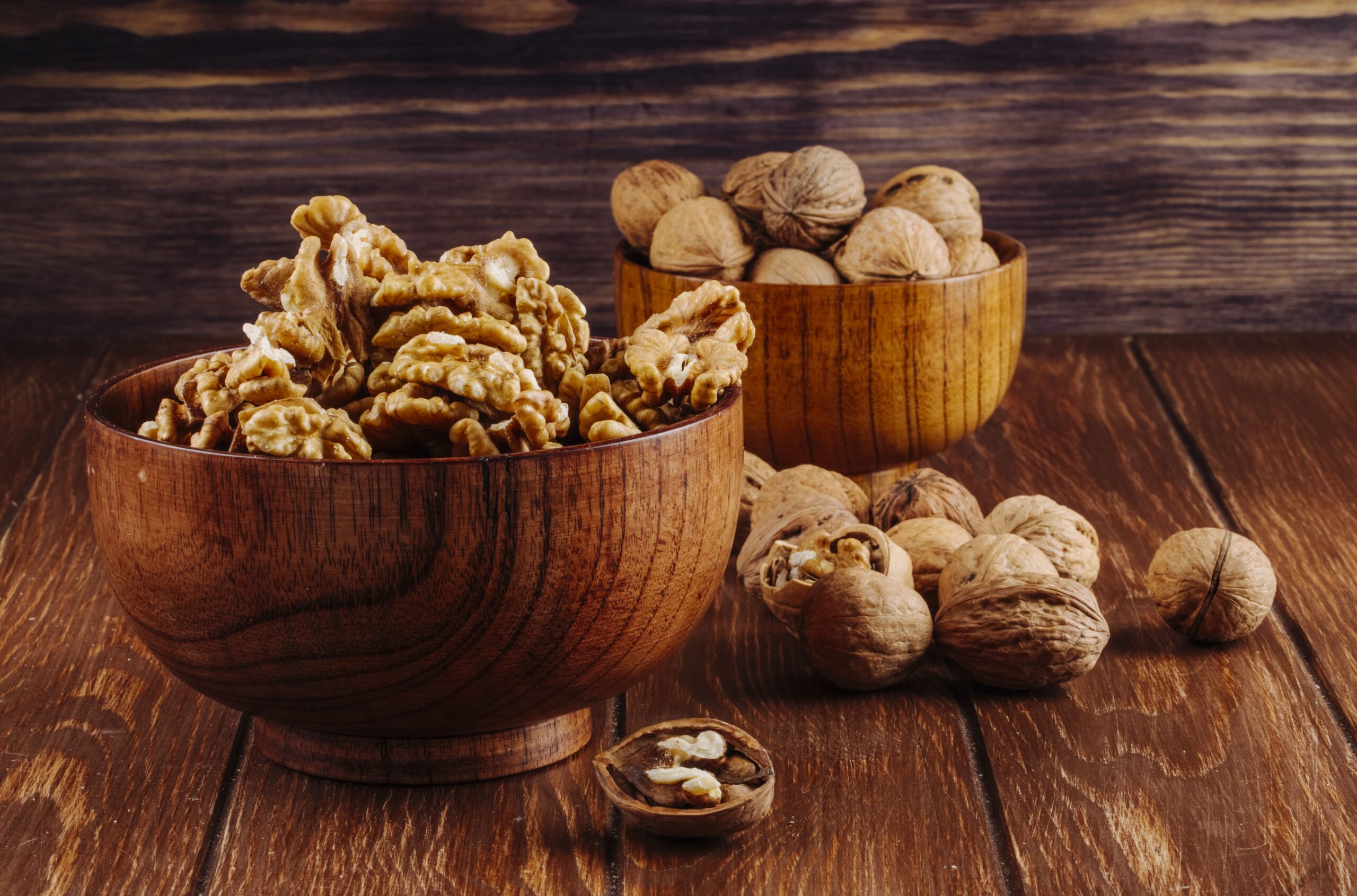Cracking the Nutritional Code of Walnuts

Walnuts, scientifically known as Juglans regia, are tree nuts that have been valued for centuries for their delicious taste and remarkable health benefits. These nuts are not only a popular snack but also a versatile ingredient in various culinary preparations.
In this comprehensive review article, we will delve into the world of walnuts and explore their significance in nutrition. We will uncover the wealth of nutrients present in walnuts and examine how these contribute to their potential health benefits.
Join us on this enlightening journey as we unlock the secrets of walnuts and discover how this humble nut can contribute to a healthier, happier you.
Different Varieties of Walnuts
Walnuts come in various varieties, each with its unique characteristics and flavors. The two most common types are English walnuts (Juglans regia) and black walnuts (Juglans nigra). English walnuts, also known as Persian walnuts, are the most widely available and widely cultivated type. They have a mild, slightly sweet taste and a thin shell that is easy to crack. Black walnuts, on the other hand, have a stronger, more robust flavor and a thicker, harder shell. They are native to North America and are often used in baked goods and savory dishes for their distinctive taste.
In addition to these two primary varieties, there are also specialty and hybrid walnuts, such as the California walnut and the Chandler walnut. California walnuts are known for their large size, light color, and creamy texture. They are commonly used in a wide range of culinary preparations and are a popular choice for snacking. The Chandler walnut, a specific cultivar of the English walnut, is prized for its extra-large size and rich flavor.
Nutritional Profile of Walnuts
Walnuts are not only delicious but also impressively nutritious. Let’s delve into the detailed nutritional profile of walnuts to understand the wealth of essential nutrients they provide:
Walnuts have gained recognition for their potential health benefits, and scientific research continues to uncover their positive impact on various aspects of human health. In the following sections, we will explore the specific health benefits associated with the consumption of walnuts.
Health Benefits of Walnuts
Walnuts offer a wide array of health benefits due to their unique nutritional composition. Let’s explore the various ways walnuts can positively impact your well-being:
1. Promote Heart Health
Walnuts have been extensively studied for their potential cardiovascular benefits. The high content of healthy fats, including omega-3 fatty acids and monounsaturated fats, in walnuts may help reduce LDL cholesterol levels and improve overall cholesterol profile. Consuming walnuts as part of a balanced diet may help lower the risk of heart disease and improve heart health.
2. Support Brain Function
The omega-3 fatty acids found in walnuts, particularly ALA (alpha linolenic acid), are crucial for brain health and function. These fatty acids contribute to the structural integrity of brain cells and play a role in neurotransmitter function. Regular consumption of walnuts may help support cognitive function, memory, and overall brain health.
3. Aid in Weight Management
Despite being energy-dense, walnuts can be a valuable addition to a weight management plan. The combination of protein, healthy fats, and dietary fiber in walnuts helps promote satiety, keeping you feeling fuller for longer. Including walnuts in your diet may help control appetite and prevent overeating, supporting healthy weight management.
4. Boost Antioxidant Activity
Walnuts are rich in antioxidants, which play a crucial role in combating oxidative stress and reducing inflammation in the body. The combination of vitamin E, polyphenols, and other antioxidants found in walnuts helps neutralize harmful free radicals and protect cells from damage. Regular consumption of walnuts may contribute to overall antioxidant activity and support optimal health.
5. Contribute to Better Gut Health
Walnuts contain dietary fiber that acts as a Prebiotic, providing nourishment for beneficial gut bacteria. A healthy gut microbiome is associated with various health benefits, including improved digestion, enhanced immune function, and reduced risk of certain diseases. Including walnuts in your diet can help promote a healthy gut environment and support gut health.

6. Protective Effects against Neuroinflammation
The anti-inflammatory properties of walnuts, attributed to their omega-3 fatty acid content and polyphenols, may have protective effects against neuroinflammation. Chronic inflammation in the brain is linked to neurodegenerative diseases such as Alzheimer’s and Parkinson’s. Regular consumption of walnuts as part of an overall healthy diet may help reduce neuroinflammation and support brain health.
7. Cancer Prevention
Emerging research suggests that walnuts may have potential cancer-fighting properties. The unique combination of antioxidants, polyphenols, and omega-3 fatty acids found in walnuts may help inhibit the growth of cancer cells and reduce the risk of certain types of cancer, including breast and prostate cancer. However, more studies are needed to fully understand the mechanisms and potential benefits of walnuts in cancer prevention.
Incorporating walnuts into your diet can be a delicious and nutritious way to reap these health benefits. However, it’s important to practice portion control due to their high calorie content. Aim for a handful of walnuts (about 1 ounce) as a serving size to enjoy their health-promoting effects.
Different Ways to Enjoy Walnuts in Your Diet
Walnuts are a versatile nut that can be incorporated into various dishes and meals. Here are some creative ways to enjoy walnuts and reap their health benefits:
Remember to store walnuts in an airtight container in a cool, dry place to maintain their freshness and prevent them from turning rancid.
Takeaway
In conclusion, walnuts are not only a delicious and versatile nut but also a nutritional powerhouse that offers a range of health benefits. From promoting heart health and supporting brain function to aiding in weight management and boosting antioxidant activity, walnuts have earned their reputation as a superfood.
Their rich content of healthy fats, protein, dietary fiber, vitamins, minerals, and antioxidants makes them a valuable addition to a balanced diet.
However, it’s important to practice portion control due to their calorie density. Enjoying a handful of walnuts (about 1 ounce) as a serving size is a great way to reap their health-promoting effects without excessive calorie intake.






